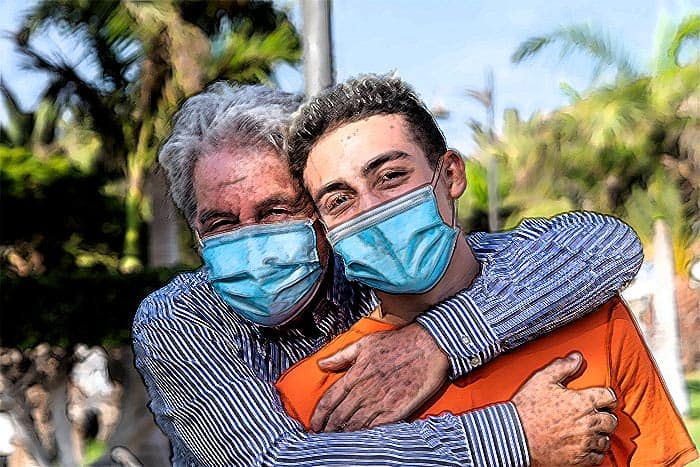There’s this idea that anger is always a bad thing, all of the time, but anger management activities for teens can help you learn to control your anger and even use it in a positive way.
The truth is that anger can be used in productive ways, as long as you’re able to harness it and not allow your anger to cause harm to yourself or others. Anger management activities and games are some of the ways to learn how to manage your anger.
Read more about anger management for teenagers.
Let’s go over some helpful anger management exercises for youth and teenagers that will help explain anger, because understanding anger in general, and then studying your own patterns, is how to really figure this out.
We’ll go over some anger management group activities for teens that you can do with friends or classmates, and we’ll point you towards some printable anger management worksheets for teens that are great for sharing with your class if you’re a teacher, or sharing with your children if you’re a parent, or sharing with your friends, or just for yourself.
Anger Management Games for Teens

Let’s start off with some anger management games for teenagers before we get into the worksheets and other resources.
Using Play to Learn New Skills
Games aren’t just about having fun, they’re one of the best ways to practice new skills. It gives you a practical way to put these skills to use, in something that is going to be more fun and enjoyable than just reading a book.
Learning games for teens are effective, just like adults can learn things through play. If anger’s a problem for you, or even if it’s not a huge issue in your life, you’ll find some useful skills to unearth and to hone using the following collection of anger management group activities for teens.
Anger IQ
Anger IQ is a game that you can purchase for around $40, and it’s great for someone who is facilitating a workshop and wants to help teens and adults understand anger and how it can impact our decision making abilities. Here’s a description:
“Give teens and adults the skills they need to make good decisions and avoid violence. Research shows that all people, not just those prone to violence, are at risk of making poor decisions when angry.
Anger IQ teaches teens and adults the impact of anger on the decision-making process so that they can better control their actions when angry feelings erupt.
Questions and prompts encourage players to analyze anger-provoking situations, identify possible consequences of bad decisions, and make good choices.“
Using a variety of prompts and guidelines, this game will cover a number of scenarios. It’s made by Franklin Learning Systems.
Anger IQ helps teens learn decision making, interpersonal relations, and anger management.
Alien Therapy
This is an interesting game that isn’t widely available, but it gives some interesting insights on combining videogames and teaching anger management, since videogames can inspire anger for people (albeit in a more fun way than other anger-provoking things, generally speaking.)
This is a shooting game that keeps track of the player’s heart rate. When the player’s heart rate gets too fast, they won’t be able to defend themselves from enemies in the game, until they calm down again and get their heart rate below a certain level.
This is an interesting tool since games can inspire anger in a real way, and the player will habitually learn to calm that anger down in order to progress in the game, which may help teenagers to learn to regulate their emotions better, as a habit, even when they aren’t playing the game.
With the availability of heart rate monitors in the form of fitness trackers like FitBit or Apple Watch, it’s probably only a matter of time until there is a widely available game that we’ll be able to download on our phones or computers, and maybe there will even be free teenage games online that will tackle anger management using something like a heart rate monitor.
Angry vs Assertive
If someone becomes very concerned about not coming off as angry or not reacting angrily, sometimes this can cause them to also lose any assertiveness. On the other hand, if someone is asserting themselves, that doesn’t necessarily mean that they’re angry.
Understanding the difference between anger and assertiveness is one of many valuable life skills for teens to possess that will help them to navigate their way to adulthood and throughout life. Being assertive can be hugely beneficial to someone who is looking to get what they want out of life, including promotions at work or even in interpersonal relationships.
Helping somebody to let go of anger and gain assertiveness is a two-fold thing, because getting rid of the anger can help make it easier to be more assertive in a more positive way.
This game poses a variety of situations and players will respond to these situations with either anger, or assertiveness.
It’s amazing how seeing these situations play out and learning examples of ways to act in them can be so helpful. Sometimes, someone who responds with anger is really just kind of confused about how to respond to an aggravation in a better way, so seeing that behavior modeled and practiced can give them other resources and tools to use, other than anger.
Thoughts and Feelings 2: A Sentence Completion Card Game
This is a game that may feel like it’s for younger kids than teens at first glance, but these are good things for teenagers and frankly, people of all ages to think about.
Thoughts and Feelings 2 is a collection of sentence-starters that lead to interesting conversations. Some of the cards have prompts such as…
- “The world would be better if…”
- “2 good behaviors I do are…”
- “I feel grumpy when…”
And many more. Sometimes, when you want to focus on understanding how your own mind works, or getting a conversation going with someone you’re looking to help, these types of prompts can help a great deal, even if they feel a little juvenile on the surface. The reason for that could be that these are things we may take for granted, without ever necessarily sitting down and actually thinking about them.
These cards aren’t just a simple type of anger management worksheets of sorts, they cover a lot of different things like depression, anxiety, coping skills for teens, and more.
More Anger Management Activities for Teens

Here are some additional strategies, activities and ideas for ways that you can manage anger in a teenager, and in other family members, too. It helps if this can be a team effort.
Setting Expectations
If you spend time with a friend’s family, sometimes you’ll notice they talk to each other very differently than you’re used to. It could be that they communicate by yelling at one another and you’re used to a different communication style, or vice-versa where you grew up in a house that “spoke loudly”, and seeing another family that are more passive or passive aggressive is kind of jarring.
By setting the rules and expectations of what’s acceptable in your household, it ensures that everyone knows what is expected of them. Doing this acknowledges that everyone understands what type of household you’re living in, while also setting boundaries of what everyone is comfortable with in terms of communication.
Now, of course, if your family’s style is to scream and yell at one another, even if everyone says they’re comfortable with it, this can create some pretty toxic habits when any of you are out in the world and interacting with other people.
Managing Stress Levels
Learning to manage stress is paramount at controlling anger. If you can keep your stress levels in check and use them as a watermark for when you’re starting to get closer and closer to anger, then this can give you better insights into managing your anger.
Stress and tension can go hand in hand, and when someone is feeling these things, it’s very difficult to avoid getting angry at things that might normally fly under your radar. If it’s difficult for even some of the calmest people, you can imagine how someone who is already dealing with anger issues will have a tough time, so that’s why learning to manage stress is so important.
Self Time Outs: One of the Best Anger Management Activities for Teens
Nobody likes going on “time out”, it can make you feel like a little kid and it’s kind of embarrassing and enraging. But if you’re able to recognize when you need a few minutes to yourself to separate yourself from a situation, it’s not a bad idea to take a self time out, of sorts.
It’s okay to tell somebody that you’re starting to feel angry, and that you feel it would be more productive if you took some time on your own to think things over before continuing the conversation. Once you’ve done that, you have the power to walk away and calm down.
If they’re a malicious person, they may ignore what you’ve said, and try to antagonize your further if they’re trying to make you angry, and in that situation you just have to remember to disengage, and that you’re doing the right thing by exiting the situation in that moment.
When you’re in a conflict with someone, it’s incredibly brave of you to be able to separate separate before things get too carried away.
No matter what they say, and its most likely their reaction will be one of understanding since they’ll appreciate you being honest with them and attempting to deescalate the situation, you are taking control of the situation and working to control your anger and that’s not the easiest route, so you should pat yourself on the back for that.
It’s Cliche, But Count To Ten
The old technique of counting to ten when you start to feel angry is popular for a reason. Sometimes, simply counting to ten in your head is all it takes to regain complete control over your feelings and emotions, and to remain calm in a situation that would otherwise aggrivate or anger you.
Sometimes, ten isn’t enough. If you can’t feel your blood pressure starting to lower after you slowly count to ten, try continuing to fifteen or twenty, or even just start over again and count from 0 to 10 once more.
If you’re with someone you’re close to and you feel comfortable talking to them, you could even let them know that sometimes, you may start counting to ten. If they know that you start counting to ten when you feel the need to calm yourself down, they will recognize nice and they can use it as an opportunity to recognize that you’re taking steps to control your anger.
This isn’t just an anger management activity for teenagers, of course, it’s something that anybody can use. It helps to have good communication, so that you aren’t just starting to count to ten out of nowhere in the middle of a conversation, so sometimes you may want to just count in your head, or as mentioned above, talk to your friend or loved one ahead of time to let them know what it means when you start counting to ten to control your anger.
Communication
This one is SO important! Communication is so incredibly important in so many different areas of life. This one goes hand in hand with something I mentioned earlier, which is to set expectations. Communication how you’re feeling is also something that’s come up several times throughout this list of anger management activities for teenagers, and for good reason.
So many situations can be made a lot easier simply by communicating just a little bit better or a little bit more with the people around you. This is, of course, very difficult to do and something that many teenagers struggle with, which is even more reason to work on communication skills.
A Collection of Anger Worksheets for Teens

Here are some resources around the web that provide excellent anger management worksheets for kids and teenagers, including a full anger workbook for teens that you can download or order. There are enough free worksheets out there that you may not need to purchase anything, however sometimes having a full workbook is worth the investment.
- Anger meter worksheets: These anger management worksheets for teens display a meter with empty places that encourage kids and teens to think about their anger on a scale, and to identify what they’re feeling.
- Anger iceberg worksheet: Here’s a take on the anger iceberg, a well-known worksheet that helps people to identify the types of feelings and emotions that we show people, and the variety of other ones that are below the surface.
- Lemons or lemonade anger workbook for teens: This is a workbook that helps teenagers to understand their anger.
These anger worksheets for teens are a good way to help groups and individual teenagers understand and harness their anger in a more productive way, making them some of the most useful anger management activities for teens.
All Teens Feel Anger, But Anger Isn’t The Same for All Teens
Anger is a normal feeling and it can be very hard to control at times, so anger management is an important skill for everyone to learn.
While anger is an important and useful emotion, it needs to be controlled and kept in check, especially for people who are quick to anger or start seeing red and losing control of themselves.
This can lead to very bad outcomes, so these anger management activities and techniques will hopefully come in useful for you or someone you care about or someone you’re instructing.
Some teens struggle with anger issues more than others do, so it can be hard to relate at times. You may look at a situation and think “Why are they getting so angry? I would never react like this…”
And that may be true, but it doesn’t change the fact that people have different triggers, difference tolerance levels for anger, and different skill sets when it comes to using the various tools that exist, like the ones we’ve discussed on this very page.
Looking For More Anger Management Activities for Teens?

This is only a portion of the countless activities that exist to help teenagers deal with anger. It’s a matter of putting together something that works for you, or for the person you’re trying to help.
Sometimes, a certain anger worksheet for teens will just *click* with someone, even if a dozen other anger management exercises for youth didn’t get the job done.
This is why it’s important to have a variety of options at your disposal, so that you can try different things until you find the anger management activities for teens that work the best for you!
